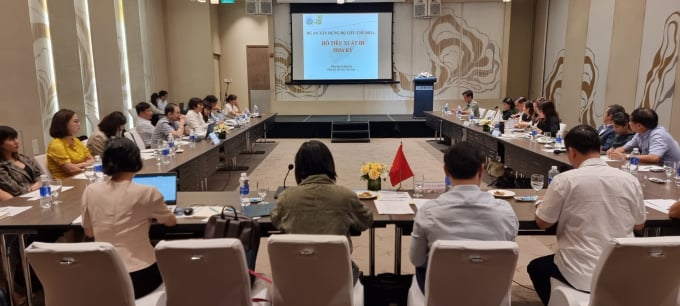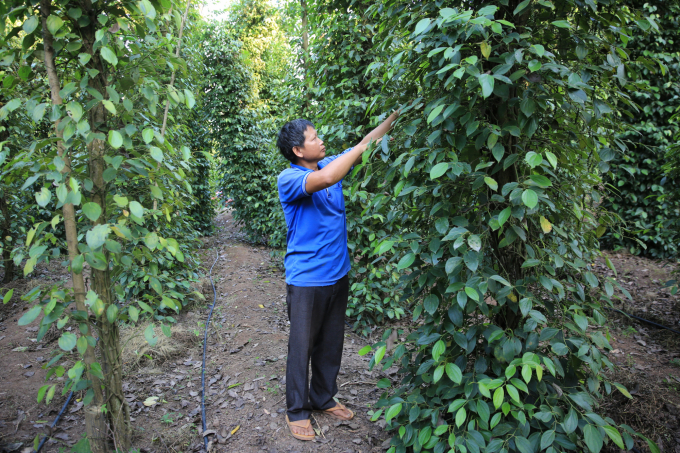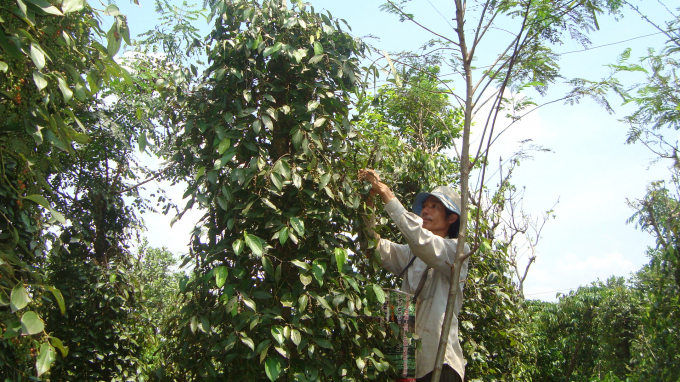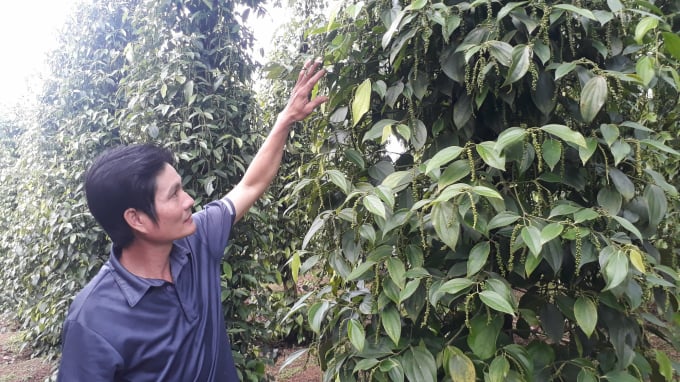June 6, 2025 | 08:45 GMT +7
June 6, 2025 | 08:45 GMT +7
Hotline: 0913.378.918
June 6, 2025 | 08:45 GMT +7
Hotline: 0913.378.918
At least 25% of pepper producers will see a 25% increase in revenue, 25,000 farmers will get training and have access to agricultural services, and 70,000 tons of peppers will be produced sustainably. In the coming years, these are the goals set by the public-private partnership group for the pepper industry.

Overview of the 6-month preliminary meeting of the public-private partnership in the pepper industry. Photo: Hong Thuy.
Nguyen Quy Duong, Deputy Director of the Department of Plant Protection Department (MARD), emphasized that the preliminary meeting of the public-private partnership group aimed to assess and seek direction for resolving some significant issues regarding the general quality of Vietnamese pepper products exported to the US market.
"We are establishing a threshold for Vietnamese pepper. The meeting also seeks to summarize and assess the implementation outcomes of the EU-funded sustainable Vietnamese pepper development project in Dak Nong, Dak Lai, and Gia Lai provinces. After the conference, the Department of Plant Protection, the Sustainable Spices Initiative (SSI), and The Sustainable Trade Initiative (IDH) will sign a Memorandum on Integrated Plant Health Management ", Duong stated.

In order for pepper products to meet the standards for export to the US market, it is necessary to follow a standard farming process according to the program of the public-private partnership group. Photo: Hong Thuy.
The memorandum between the three parties includes: supporting and promoting sustainable pepper production in Vietnam via responsible management of pesticide use; strengthening effective cooperation of public-private partnership to control pesticide residues in pepper production to meet market requirements; promoting safe production links; improving policies and capacities of public partners to scale up sustainable pepper production; and calling on fertilizer enterprises to build models of using organic fertilizers in Dak Lak and Dak Nong.
The adjustment of the maximum residue limit (MRL) in accordance with the United States' standard, according to Duong, is one of the most important factors for enhancing pepper product exports to the U.S. market. "The whole system, including state agencies, enterprises (private group), farmers, and social organizations, must be involved in addressing the excessive chemical residues," Duong noted.
The group of businesses is vital. The present cooperation group, comprised of eight businesses, is effective in establishing connections with farmers, managing production, and training farmers in cultivation techniques, among other tasks. And the Department of Plant Protection will support these training sessions, which include instructions on the "4 proper" use of pesticides.

It is necessary to involve the whole system, including the central agencies, local authorities, businesses, and farmers to ensure the sustainable development of pepper cultivation. Photo: Hong Thuy.
The public-private partnership group will also assist key farmers with training in sustainable agriculture, plant health, and the environment. The initiative will assist with production and environmental issues, including pesticide residues. This is the method through which the Food and Agriculture Organization of the United Nations (FAO) funds the Department of Plant Protection to establish an action plan for 2030 with a vision for 2050.
At the meeting, the conference also discussed a number of other issues that businesses and international organizations are interested in, such as the use of child labor in the pepper production industry, and land degradation in the pepper-growing area in the Central Highlands.
In the last six months of 2022, the group recommends constructing an environmentally sustainable production program to restore the health of the soil.
The most essential objective of the pepper industry's public-private partnership program is safe production, sustainable agriculture, and ecological agriculture.
Vietnam is the largest pepper producer and exporter in the world, accounting for around 60 percent of the global pepper trade volume. However, the Vietnamese pepper business faces significant obstacles such as poor selling prices, lack of sustainability, and an inability to satisfy markets' ever-increasing demands.
"It is crucial to guarantee that exported pepper products do not include pesticide residues. China, the main import market for Vietnamese pepper, has increasingly stringent food quality criteria. Therefore, the production of pepper in a sustainable manner is an essential and vital responsibility. One of the highest priorities of the public-private partnership in the pepper industry is to assist small and medium-sized businesses and farmers in controlling pesticide residues in pepper; chain production links; and promoting communication and replication of safe pepper production models.", Duong elaborated.

Pepper growing area in the Central Highlands is increasingly seriously degraded, significantly affecting the quality of pepper. Photo: Hong Thuy.
The Department of Plant Protection plays a focal role in promoting the improvement of the policy system and capacity in managing and guiding the responsible use of pesticides, promoting safe production linkages, and managing food safety and original traceability of exported pepper in order to increase the scale of pepper production and meet market standards for safe, sustainable production.
According to the EU-Vietnam Free Trade Agreement (EVFTA), EU nations are committed to reducing tariffs on pepper products as soon as the agreement enters into force, particularly for processed items with prior tax rates ranging from 5 to 9 percent. Vietnam's exports of pepper are enjoying great opportunities in the EU market. EU investors are considering relocating their processing operations to Vietnam to take advantage of the country's affordable raw materials and labor. It is the main force behind the promotion of pepper exports to varied EU markets. In such a case, unground or unground black and white pepper will be the industry's primary exports.
Germany and the Netherlands maintained their position as the leading importers of Vietnamese pepper. Therefore, opportunities exist for pepper products to rise in value and for pepper farmers to raise their revenue. To get this possibility, however, it is required to rigorously follow the contents and plans presented by the public-private partnership group.
Translated by Linh Linh

(VAN) VAAS and numerous Vietnamese enterprises have signed cooperation agreements with Japanese partners to promote agricultural technology and trade connectivity.
/2025/05/29/5625-12-214801_567.jpg)
(VAN) Provincial mergers in the Mekong Delta promise to streamline administration, expand inter-provincial raw material areas, and foster close linkages in agricultural value chains, benefiting both businesses and cooperatives.

(VAN) Merging Mekong Delta provinces contributes to the expansion of agricultural raw material areas, addressing previous constraints caused by provincial boundaries. Additionally, this expansion will reduce costs and strengthen linkages between businesses, cooperatives, and farmers.
/2025/05/29/1043-2-153730_145.jpg)
(VAN) The Government's policy to merge provincial-level administrative units opens up major opportunities for the Mekong Delta region to reshape its agricultural development strategy toward large-scale production, effective regional linkages, and sustainability.

(VAN) The mutual export of agrifood products between the European Union (EU) and the United Kingdom (UK) must occur again without certification, border controls or other red tape. This was agreed at the UK-EU summit.
/2025/05/22/5121-2-173645_677.jpg)
(VAN) NBSAP Tracker identifies strengths and areas for improvement in the National Biodiversity Strategy, based on each region’s priorities and capacities.

(VAN) The draft amendment to the Circular on rice export trading stipulates a periodic reporting regime for rice exporting enterprises.